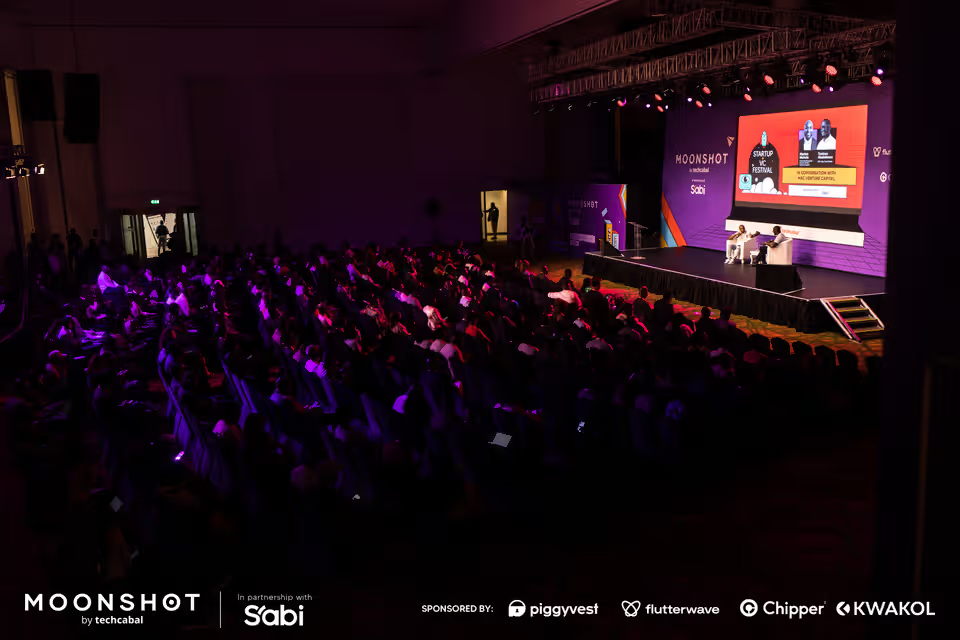TechCabal’s flagship tech conference, Moonshot, took off with a bang on its first day, featuring a plethora of insights, discussions, and ambitious plans for Africa’s tech ecosystem. The event, held on Wednesday, October 11, marked a significant gathering of influential players and innovators in the African tech space.
Day one of the conference which was hosted by Fatu Ogwuche and Olumuyiwa Olowogboyega was filled with engaging sessions. Tomiwa Aladekomo, the CEO of Big Cabal, the parent of TechCabal, delivered a welcome address that set the stage for Moonshot’s objectives. “Innovation is not a distant dream, it’s a tangible force changing the future of the continent,” he said.
A conversation with Bosun Tijani
Nigeria’s Minister of Communications, Innovation, and Digital Economy, Bosun Tijani, in a chat with Aladekomo properly explained his plan to train three million technical talents over the next four years. This initiative aims to bridge the tech talent gap in Nigeria and position the country as a competitive force in the global tech arena.
Tijani outlined a phased approach that will reach this ambitious target across the 34 states in the country. “We are using a 1-10-100-model. We are starting with 1% of our 3 million target and that will be for the first three months. And that 1% is going to be 30,000 people. So starting this Friday, you will see applications being released for both trainers and those who want to be fellows,” he said.
During his remarks, Tijani also noted the importance of research and development for startup growth: “We have more contractors playing in our ecosystem than builders, Contractors supply solutions they don’t build, the problem with that is there’s no research and development. If the market is controlled by people who import solutions and sell, instead of those who build, there’ll be no innovation.”
Building Nigeria’s digital economy
Juliet Ehimuan, the former director of Google West Africa, discussed the key components needed to foster Nigeria’s digital economy. She emphasised the importance of access to the marketplace, locally relevant content, talent development, and funding for tech entrepreneurs. Building a thriving digital economy in Nigeria requires a strategic focus on these elements.
On his part, Oswald Osaretin Guobadia, Managing Partner at Digit A, highlighted the importance of public-private partnerships in growing the digital economy. “To grow the digital economy, it’s important to collaborate with the government. Let’s stop with the apathy,” says Guobadia, who previously served as an aide to the immediate Nigeria’s president on digital transformation.
Underscoring Guobadia’s submission, Tunbosun Alake, the Lagos state commissioner for science and technology noted that the state’s collaboration with private players in the ecosystem has made a notable impact on their growth. “In the early 2010s, the Lagos state infrastructure management agency and MainOne partnered to install fibre-optic cables in Yaba, this helped startups like Andela,” Alake said during a panel discussion at Moonshot.
Last year, the Lagos state government disclosed its plan to launch a venture capital fund to enable Nigeria’s tech ecosystem. Lagos, the economic centre of West Africa, is the launch-bed of several leading African startups and unicorns like Interswitch, Flutterwave, Paystack and Jumia.
In October 2022, Alake told Bendada.com that the Government wants to step in to de-risk the ecosystem and turbocharge its growth. One of the ways they will do this is by providing capital to startups. Funding is one of the four framework pillars of the Lagos State Innovation Masterplan that is designed to catalyse the growth of the innovation ecosystem in the budding ecosystem. “Ultimately we are looking at a fund of funds,” he added.
Building amidst challenges
Throughout the day, speakers highlighted challenges in the tech ecosystem, including regulatory complexities, talent gaps, and bad actors. Solutions were proposed, such as extensive due diligence by VCs before investing in startups, conservative spending by venture-backed startups to extend the runway and fostering partnerships and ecosystem support to help lesser-known startups succeed.
Zoom out
The first day of the TechCabal Moonshot Conference also featured exhibitions from sponsors and partners including Sabi, Flutterwave, Kwakol, Chipper Cash, Sparkle and Piggytech, who publicly launched the physical debit cards of their payment solution, Pocket at the conference.
Fireside chats, panels, and presentations were also held to address various aspects of the tech landscape. Notable sessions included David Adeleke’s session on scaling AI’s impact on the continent; and a session on “Thinking about risk and reward in Africa”, where investors like Maya Horgan Famodu and Olumide Soyombo shared insights on investing in African tech. Workshops by industry professionals were a key attraction. Victor Fatanmi’s workshop on brand building and Blessing Abeng’s workshop on personal branding pulled massive crowds.
The Moonshot Conference’s first day demonstrated its commitment to fostering innovation, collaboration, and growth within Africa’s tech space. With a diverse range of sessions, it provided attendees with valuable insights, strategies, and ambitious goals to shape the future of the African tech ecosystem.
Get passive updates on African tech & startups
View and choose the stories to interact with on our WhatsApp Channel
Explore




